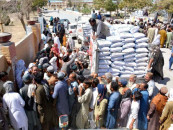K-P’s malaria cases tripled last year
Half a million individuals affected in province

Khyber-Pakhtunkhwa handled a significant public health crisis, with a startling 300% surge in malaria cases attributed to torrential rains and flash floods that occurred last year.
Arshad Roghani, the Director of Public Health, expressed grave concern over the alarming rise, revealing that reported cases reached a staggering 500,000.
This sharp increase had prompted urgent measures to contain the spread of the disease, including the distribution of approximately two million anti-mosquito nets across the province. The situation was particularly dire in Shangla district, which emerged as one of the hardest-hit areas.
In Shangla district alone, there were an astounding 108,000 reported malaria cases. Other districts also experienced significant outbreaks. 70,000 cases were recorded in DI Khan district, 44,000 in Lakki Marwat, 24,000 in Karak, 40,000 in Tank, 24,000 in Khyber tribal district, 17,000 in South Waziristan, 44,000 in Buner, 34,000 in Bannu, 17,000 in Nowshera, 8,000 in Mohmand, 10,000 in Bajaur and 13,000 in Mardan.
The scale of the outbreak underscores the urgent need for effective public health interventions to prevent further spread and mitigate the impact on vulnerable populations.
Meanwhile, in Upper Kohistan district, another health crisis has emerged, this time suspected to be a measles outbreak. The Health Department dispatched medical teams to the affected area and established an emergency control room to monitor the situation round the clock.
Read Climate change impeding fight against AIDS, TB and malaria
Tragically, eight children have already lost their lives to the suspected outbreak, raising concerns among health officials and prompting immediate action to prevent further casualties.
Samples collected from infected patients have been sent to the National Health Laboratory in Islamabad for verification, with the test results expected to shed light on the exact cause of the deaths.
In the meantime, an emergency vaccination campaign targeting children has been launched in the affected area to prevent the spread of the disease. Dr. Arif, head of the Extended Immunization Program, emphasized the importance of vaccination efforts while cautioning against prematurely attributing the deaths to measles without conclusive evidence.
This recent outbreak echoes a similar health crisis that occurred in June 2023, when a surge in measles cases affected 42 union councils in the Rawalpindi district. In response, health authorities launched an emergency vaccination campaign aimed at immunizing all children between the ages of six months and five years across the affected areas. Respiratory issues emerged as a common symptom among affected children, prompting action to contain the outbreak and prevent further complications.
To address the urgent situation, the District Health Authority mobilized a significant medical workforce, including experienced physicians, to administer vaccinations and implement a comprehensive six-day case response protocol. The vaccination campaign targeted union councils in Rawalpindi City, Rawalpindi Cantt, Taxila, and rural areas, where measles cases had been reported.
Published in The Express Tribune, January 31st, 2024.



















COMMENTS
Comments are moderated and generally will be posted if they are on-topic and not abusive.
For more information, please see our Comments FAQ